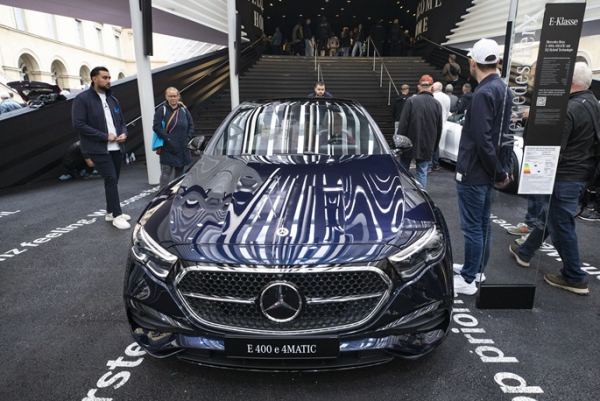Europe’s auto industry divided over EV transition

European automakers remain divided over the EU's transition to electric vehicles (EV), with executives warning that rigid policy timelines could erode Europe's competitiveness in internal combustion engines, reported Xinhua.
While actively promoting their new electric models at the 2025 International Motor Show Germany (IAA Mobility) in Munich, which concluded earlier this month, executives of some automakers have also urged a delay to the EU's planned 2035 ban on new petrol and diesel cars.
Faced with fierce competition, Europe's automakers need to tread cautiously ahead to keep a subtle balance between the EU's ambitious climate targets and market realities, analysts say.
INDUSTRY PUSHBACK
The EU's ambitious carbon dioxide reduction targets are no longer feasible, Europe's two main automotive associations — the European Automobile Manufacturers Association and the European Association of Automotive Suppliers — argued in a joint letter to European Commission President Ursula von der Leyen in August, urging a more pragmatic approach that reflects industrial and geopolitical realities.
The issue gained renewed attention at IAA Mobility, during which German Chancellor Friedrich Merz voiced support for the industry's electrification efforts while stressing the importance of regulatory flexibility, cautioning against politically mandating a single technological path and urging the industry to remain open to different technologies to balance competitiveness with climate protection.
Executives from Mercedes-Benz, BMW and Stellantis described the EU's planned 2035 ban on the sale of new petrol and diesel cars as "unrealistic," calling for continued development of hybrids, range-extended EVs and smaller combustion engines.
The industry's market performance so far has underscored the challenge. First-generation EVs, including Volkswagen's ID series, Audi e-tron, Mercedes EQ and BMW i series, have faced limited consumer adoption, hindered by range constraints, slow charging, design shortcomings and prices higher than comparable combustion vehicles.
As a result, several manufacturers are revising their strategies. Mercedes-Benz has delayed its target of achieving 50 percent EV sales by 2025 and plans to continue updating internal combustion engines over the next decade. Audi has put on hold its plan to fully electrify by 2032. Volkswagen Group Chairman Oliver Blume has highlighted slowing EV sales and called for carbon dioxide target adjustments, while Renault's former CEO Luca de Meo has repeatedly urged more flexible, market-aligned timelines.
MULTIPLE CHALLENGES
Europe faces multiple challenges in its automotive transition.
The region's battery sector is struggling. Swedish startup Northvolt, once a high-profile venture backed by BMW, Volkswagen and other investors, filed for bankruptcy in late 2024. Its failure underscored Europe's persistent gaps in battery technology, supply chains and domestic manufacturing capacity.
Policy changes have added to the strain. Germany ended EV purchase subsidies in 2023, weakening Europe's largest market. Major automakers reported falling profits, and the sector shed roughly 51,500 jobs last year, nearly 7 percent of the workforce.
Structural challenges have compounded the difficulties. Charging infrastructure remains uneven across EU member states, electricity costs are high, production expenses continue to rise, and U.S. tariffs have weighed on exports. Together, these factors have made the push for rapid electrification a significant challenge for European manufacturers.
Political pressure is intensifying. Italian Prime Minister Giorgia Meloni has condemned the ban as "self-destructive," warning of social and economic fallout. Poland and other countries have voiced similar concerns.
Experts say that the EU auto industry's caution reflects realistic difficulties resulting from competition pressure, technological gaps and employment concerns.
POLICY DEBATE
Some European automakers have called for a multi-technology approach. The European Automobile Manufacturers Association recommends incentives such as subsidies, tax breaks and electricity discounts to boost EV adoption. While EVs are expected to dominate in the long term, low-carbon alternatives remain necessary during the transition.
Other companies, including Volvo and some industrial manufacturers, support the EU's 2035 ban on new petrol and diesel cars, seeing it as crucial for maintaining Europe's global competitiveness. Kia Europe CEO Marc Hedrich warned against policy reversals, noting that production of the EV4 has begun in Slovakia, with full compliance expected by 2035.
German automotive expert Ferdinand Dudenhoeffer called opposition to the ban largely unnecessary, saying that as EV prices converge with combustion vehicles and carbon taxes take effect, gasoline and diesel cars will inevitably lose their appeal. He predicted that price parity would be reached by 2030, easing much of the controversy over the ban.
At a Sept. 12 strategy dialogue chaired by von der Leyen, manufacturers called for more flexibility on carbon dioxide targets, while the EU reaffirmed the 2035 timeline. In March, new-car carbon assessments were delayed from 2025 to 2027 to provide a transitional buffer. Critics argue this could reward lagging companies and weaken overall competitiveness.
Experts say that the EU's 2035 ban on new petrol and diesel cars is both an industrial target and a test of the bloc's climate leadership. Sticking to the goal could spur innovation, while compromises may ease short-term pressures.
- Europe
- Auto industry
- divided
- EV transition
Source: www.dailyfinland.fi
